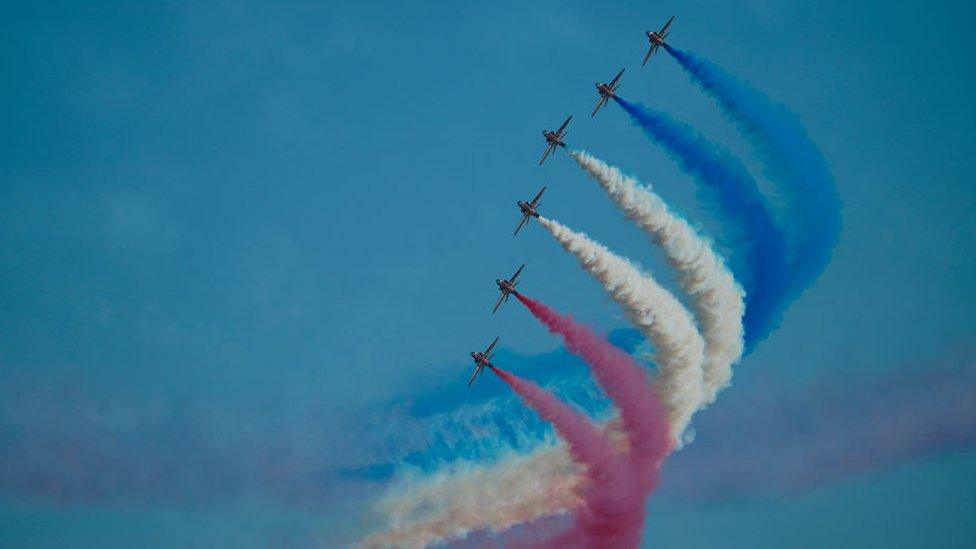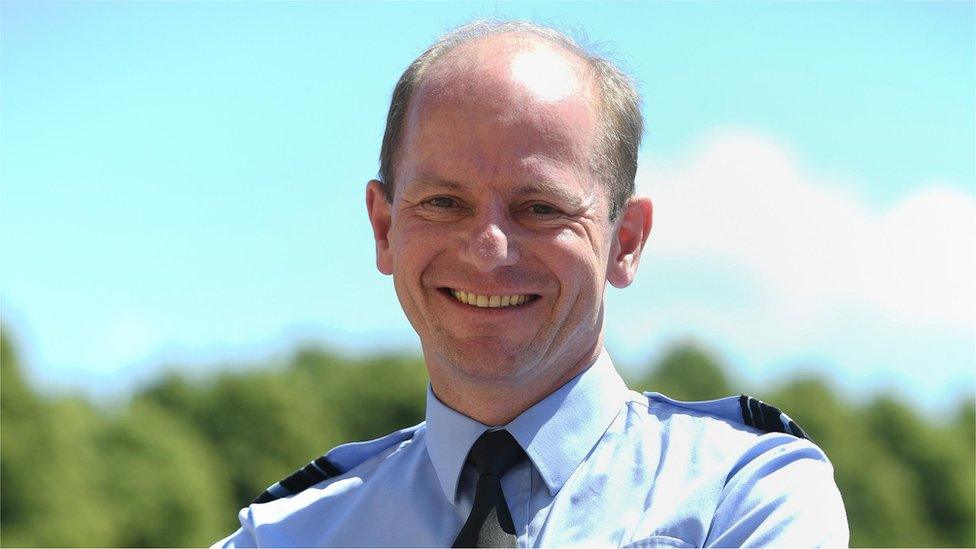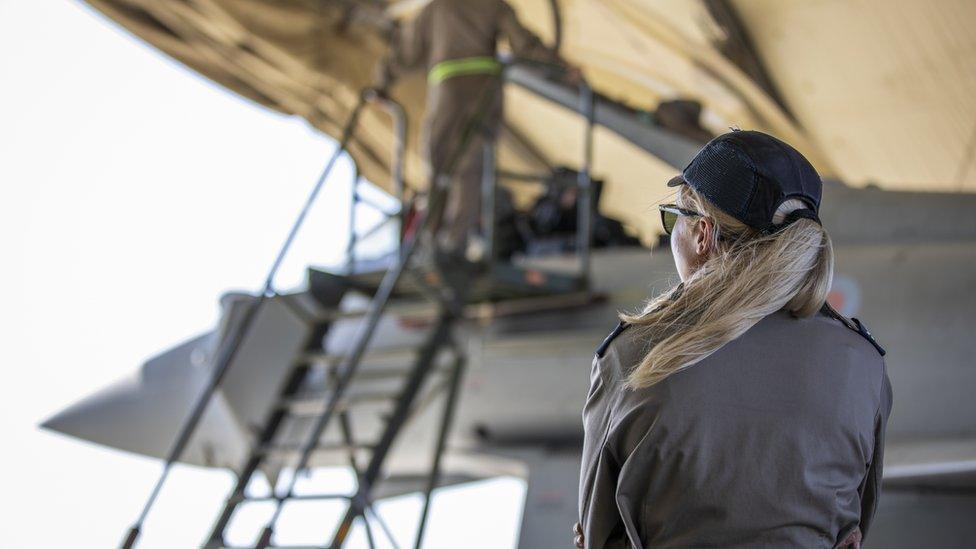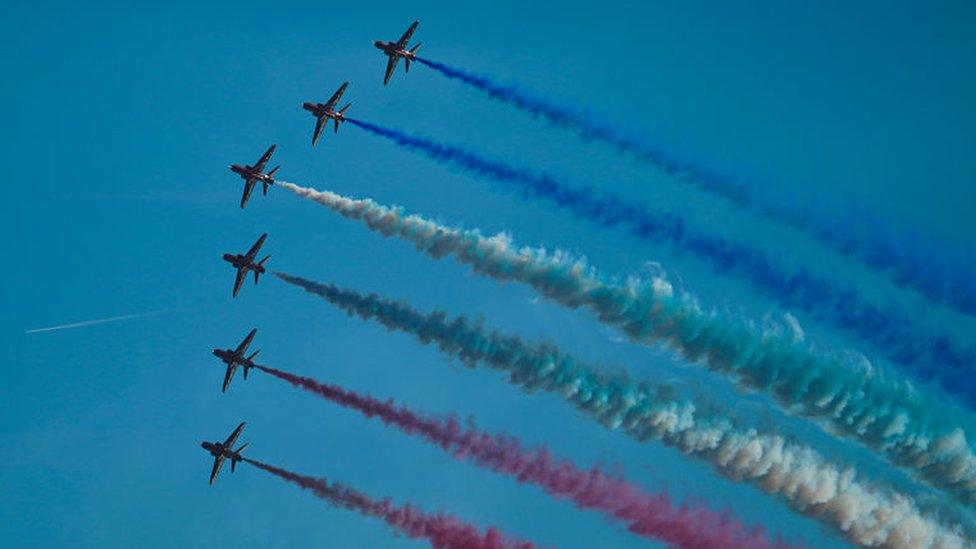Red Arrows: What is going wrong at the RAF?
- Published

The Red Arrows Aerobatic Team of the RAF fly over Falmouth Bay on 10 August
The RAF display team the Red Arrows is meant to be one of the crown jewels of the Royal Air Force.
The service's shop window to the public and the world.
But this year it has been a shadow of its former self. The team of nine Hawk jets has been reduced to just seven.
Some of the team's elite pilots have gone - without any official explanation.
This smaller display team in their distinctive red Hawk jets have still managed to wow the public in air displays this summer all over the country.
But a more seasoned defence observer told the BBC that their aerobatic displays were looking a little tired.
There may be a number of explanations.
Their Hawk jets are ageing and there has been a spate of tragic accidents in recent years.
But this same observer suggested it might be more - with issues of morale.
There are now serious allegations of larger problems under the surface.
Last week, the Sun, external reported that one of the team's elite pilots had been suspended, another had resigned in protest at a "toxic culture", and another had moved on for unexplained reasons.
There has been enough of a crisis to prompt the Chief of the Air Staff to order an inquiry into the Red Arrows. It started last December and has still to be completed.
But the Times, external reports that it has already highlighted allegations of bullying, misogyny, sexual harassment and drunkenness - and included complaints from young female recruits.
The Red Arrows team is more than the pilots. With its support team and ground crew, it is 130 strong.
In a statement, an RAF spokesperson confirmed an investigation into allegations of unacceptable behaviour within the Red Arrows was under way.
They said it would not be commenting on individual cases.
But a Ministry of Defence source has confirmed that a number of service personnel, who were part of the team, are subject to investigation following allegations of inappropriate behaviour.
The RAF firmly denies that any pilots have flown while drunk.
However, the allegations are already a major embarrassment for the RAF and its head, Air Chief Marshal Sir Mike Wigston.
The Chief of the Air Staff is already at the centre of a controversy over the RAF's diversity targets.
He has set ambitious goals for the RAF to dramatically increase the proportion of women and Black and Asian recruits within the service.
He wants its intake to be 40% women and 20% ethnic minorities by 2030.
Not everyone in the RAF thinks this is achievable or necessarily good for morale.
One senior recruitment officer, a female group captain, has already resigned her post in protest after recruitment at RAF Cranwell was slowed down to look at ways of boosting diversity.
A bigger problem?
Supporters of Sir Mike applaud his efforts to make the service more diverse - along with his efforts to root out so-called unacceptable behaviour. The armed forces have long been criticised for not doing enough on either.
But his critics see the recent spate of bad news for the RAF as a sign of "drift" under his leadership.
Sir Mike was a surprise choice for head of the air force, by the then-Defence Secretary Gavin Williamson. One RAF officer told the BBC he had risen without trace.
But he made his mark when Mr Williamson commissioned him to conduct an urgent review of the armed forces following serious allegations of sexual assault.

Air Chief Marshal Sir Mike Wigston is Chief of the Air Staff, the head of the RAF
The Wigston Report, published in 2019, into inappropriate behaviour was meant to mark a shift in the culture of the armed forces.
It certainly explains Sir Mike's zeal to root out bad behaviours and to increase the representation of women and ethnic minorities in the RAF.
But some serving and recently retired RAF officers, who the BBC has spoken to, question whether he has lost sight of the raison d'etre of the RAF - to fight and win wars?
Few believe the RAF was a big winner in the recent defence review.
There is certainly evidence that serving and recently retired personnel have been willing to speak out to the press - most anonymously.
The BBC has been told that it has now prompted the RAF's top brass to conduct several simultaneous leak investigations.
Its summer of bad headlines may just be unfortunate. Or does it suggest a bigger problem?
Related topics
- Published17 August 2022

- Published24 August 2022
